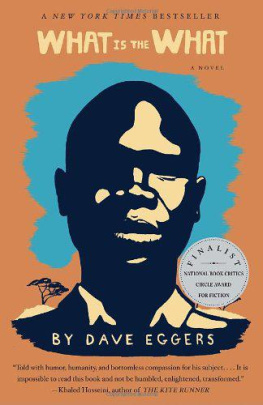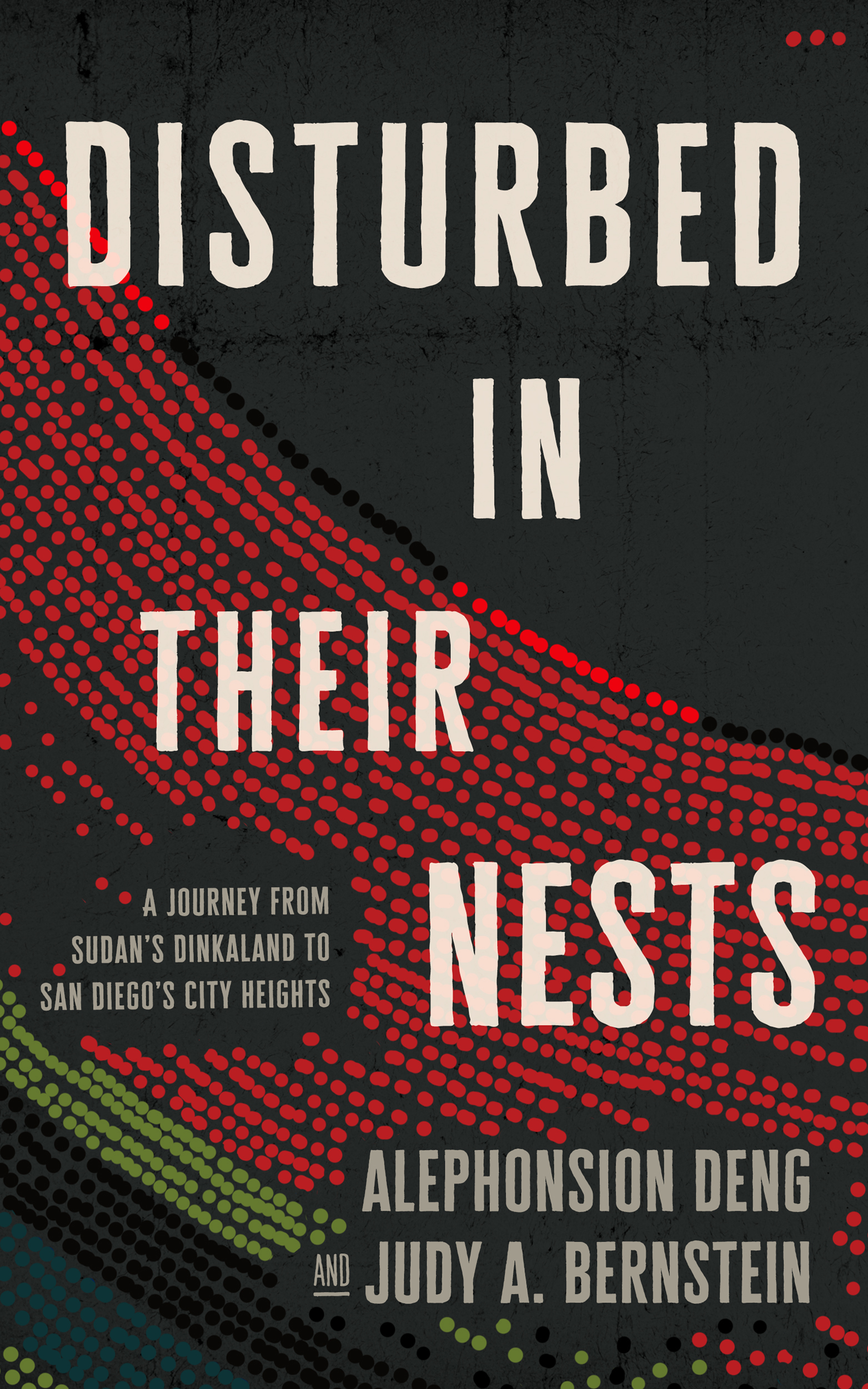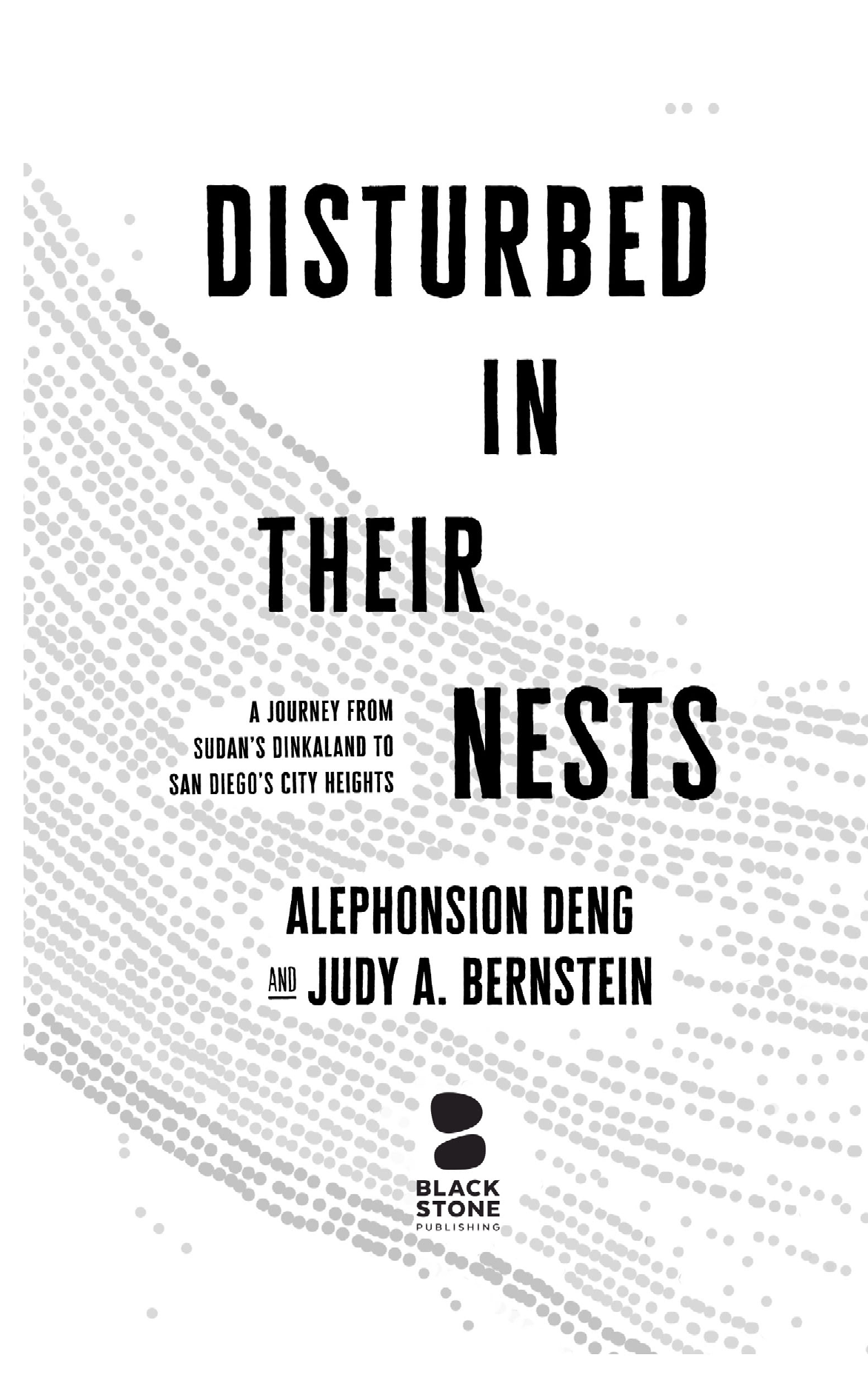Copyright 2018 by Alephonsion Deng and Judy A. Bernstein
E-book published in 2018 by Blackstone Publishing
Cover design by Kathryn Galloway English
All rights reserved. This book or any portion thereof may not be reproduced or used in any manner whatsoever without the express written permission of the publisher except for the use of brief quotations in a book review.
Trade e-book ISBN 978-1-5047-6247-2
Library e-book ISBN 978-1-5047-6243-4
Biography & Autobiography / Personal Memoirs
CIP data for this book is available from the Library of Congress
Blackstone Publishing
31 Mistletoe Rd.
Ashland, OR 97520
www.BlackstonePublishing.com
Dedicated to all refugees
PART ONE
AUGUST 2, 2001SEPTEMBER 2, 2001
DESTINY TREE
Alepho
KENYA
In 2001, nothing was more important to me than the board beneath the big acacia tree in the middle of Kakuma Refugee Camp. There, they posted the list of lucky boys who would leave the camp for a new life in America.
Since the program had begun a year earlier, three thousand Lost Boys of Sudan, as the United Nations named us, had already boarded a plane bound for the land of opportunity. My turn had not yet come.
Now it was August. Another week, another list, another chance.
I made my way down Kakuma Road, past row after row of mud huts, light bouncing off their flattened-oilcan roofs. Heat seared my calloused feet. Boys emerged from their huts, some holding hands, all walking in that determined way, eager to know their fates at the board.
There was no opportunity in Kakuma camp. No future. Everyone wanted to leave. But war still raged back in Sudan, and other countries wouldnt have us. The resettlement program to America was our only hope.
Thered been some weeks when no list went up on the board under the tree, no plane landed on the dirt strip outside camp, and no one left for their new life. When that happened, I focused on school because I knew the resettlement program could end before my chance came. Id also heard that some boys files had been stolen and sold, and I worried that at any time my file could go missing too. But once I had an education, no one could take that away.
It was possible Id never be able to leave Kakuma camp. Life had taught me to keep my expectations calm, because when dreams did not come true it was disappointing. Disappointment could turn to sadness, and sadness made everything seem futile. It could even endanger lives, for young men with nothing to hope for and nothing to lose can be dangerous indeed.
At the sound of footsteps, I turned and looked back over my shoulder. Benson, my brother, caught up to me on the road. His turn had not yet come either.
Who will stand in the ration line tomorrow? he asked in Dinka, our native language.
We took turns getting up at four in the morning and standing in line all day. I will, I said. Because if my name is on the board, I will be gone.
He laughed a nervous laugh. Do you think if your name is there today, you will be in America tomorrow?
I smiled. We joked because that was our way of coping with our situation, but my stomach burned with hunger. Every two weeks all the refugees lined up in the scorching sun for the dried corn distribution. The corn still had to be ground, so a percentage of our ration was needed to pay the grinder. Then we all collected firewood; the corn required hours of cooking to be edible. Once a day, in the afternoon, my brother and I ate together from a large pot. Wed been surviving on that one meal we called asida for nine years, always making sure that we didnt eat too much any one day, or we wouldnt have enough to last until the next ration day. We always ran out though. We called those foodless days black days .
Today was a black day. But not even the mud we collected from the stream would have settled my stomach. Not even asidanothing would help until I saw my name on the board.
We walked along the road, each lost in his thoughts. Would this be our day? Would we be together, or separated for years again, maybe this time forever? We didnt share words the rest of our way to the destiny tree.
When I was five, war separated Benson from me. That night, when our village was attacked, my mother shook me awake. Alepho, Alepho, wake up! She sounded frightened. I heard distant thunder. Something was not right. You must go with your brother now!
My eldest brother grabbed my hand and dragged me through the door. Outside, thunder roared and lit the sky at the same time. What was this? Was it getting closer?
We went out into the tall elephant grass, and when I tried to ask questions my brother hushed me. There was a loud noise, popping sounds from the next village. Frightened, I waited with my brothers.
Suddenly, men on horseback with flaming torches raced through our village. Sharp pops whistled and split the air. People fell. There was an explosion.
Stay down, my brother said when he saw that I was reaching my neck out, trying to see what was happening to our homes.
So, we crouched. My heart battered my chest. Is this the danger? My father had warned me that if danger came, I must run.
Yes, my brother said and gripped my hand tighter.
With each explosion, the black sky lit up like day. Where were our mother, our father, and the rest of our family? Sobs shook my body. I want to go home.
We cant. Its not safe, he told me.
What about Benson? He was at my oldest sisters house in another village two hours walk away.
I dont know.
I couldnt see our village to understand what was happening. I reached to part the grass. My older brother grabbed my hand back and wouldnt let go. Stay down. They will see us. We remained like that, huddled in the stalks. My body didnt stop shaking all night.
Hours later, a dull orange lit the horizon. The explosions and screaming had stopped.
I said, Its quiet. Can we go home now?
Soon.
We slept a little in the grass and waited until the sun came up, then crawled from the bush.
In the distance, smoke sat over the area where our village lay. The silence put fear in me. Was my family still alive?
As we crept closer, our eyes wide and searching for danger, I heard crying. We came to a hut. Its roof, now black burned grass, had fallen inside. Outside, a family clung to each other huddled over a child. I couldnt look at his injured leg.
I pulled from my brothers grasp and ran past other huts, some burned, some still with their roofs.
Ours came into view. The roof was there. Our mother was in front with my baby brother at her breast. My father stood beside her. Theyd survived the attack. They were alive.
Id never been so happy in my life. I fell into their arms. Tears poured down our cheeks.
We remained there together the whole day, weeping, with smoke and ash all around us. My father went off to help others, but came back often to check on us.
At the end of the day, as the sun sank and the light was nearly gone, a figure stumbled out of the darkness. My oldest sister. Her mouth moved but no sound came out. My father rushed to meet her, and she collapsed into his arms.
Oh, Ma! Da! she cried. We cant find Benson.
Benson had been seven when hed disappeared that day.
Now, fourteen years later, we were in Kakuma camp, back together, but for how long?
We reached the shade of the old acacia. A large crowd of Lost Boys were gathered. The representative from the International Organization for Migration (IOM) pushed his way through the crowd to the board. His stapler banged up a list of names. The boys jostled for position and chattered like weaver birds.




